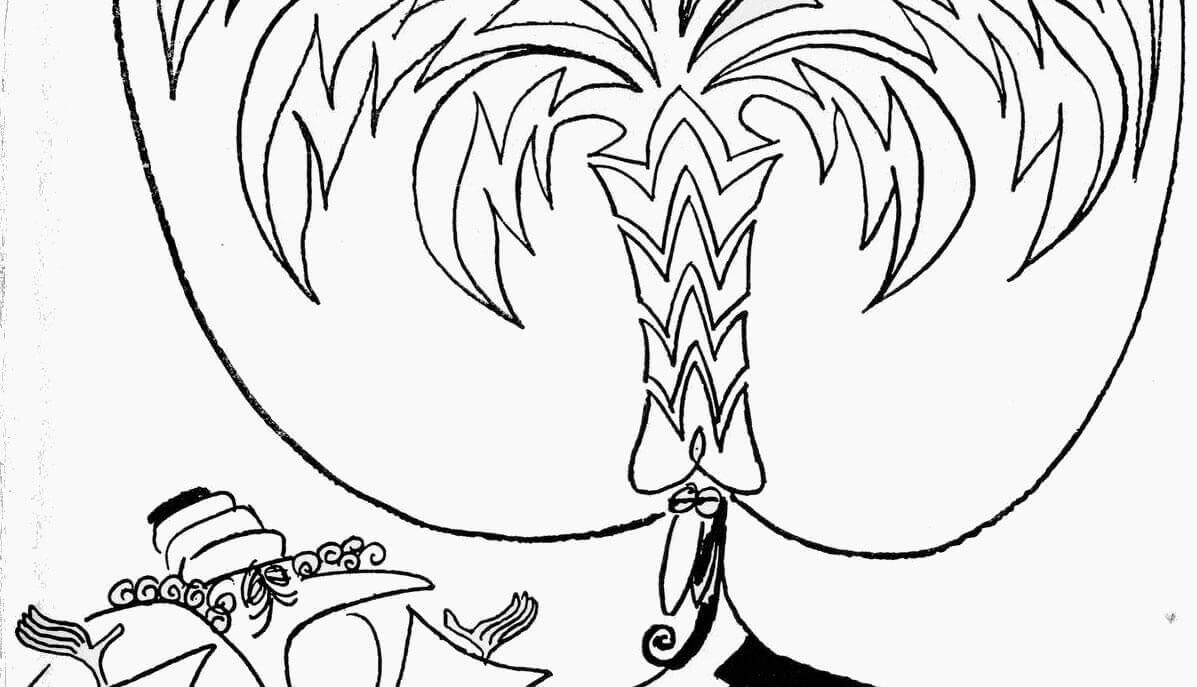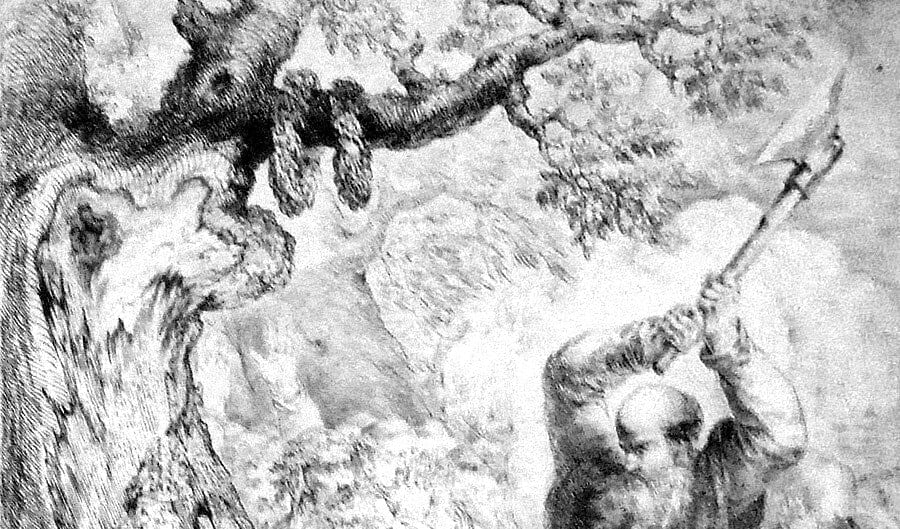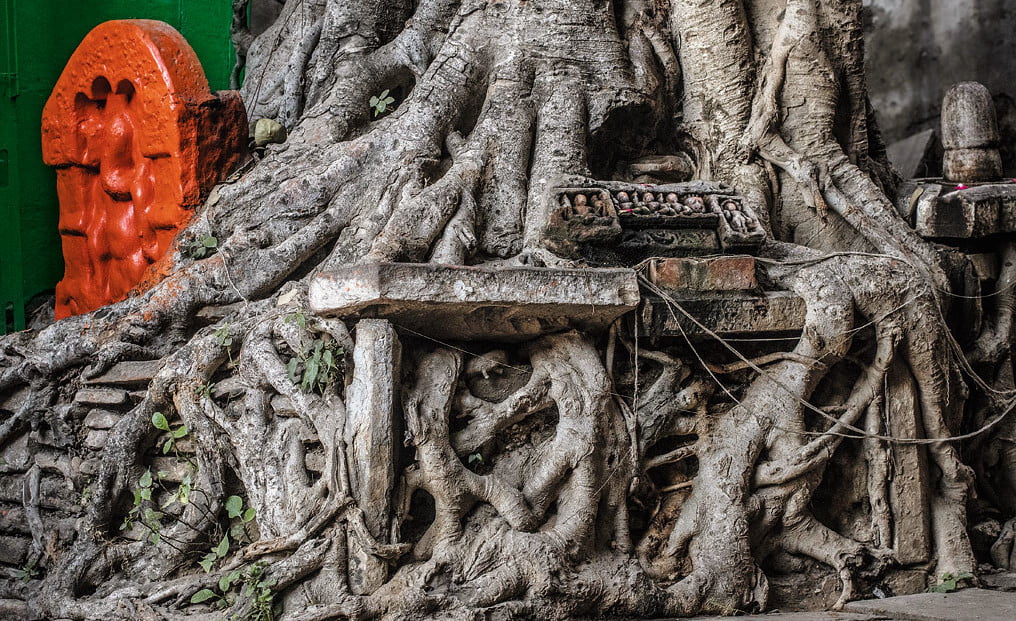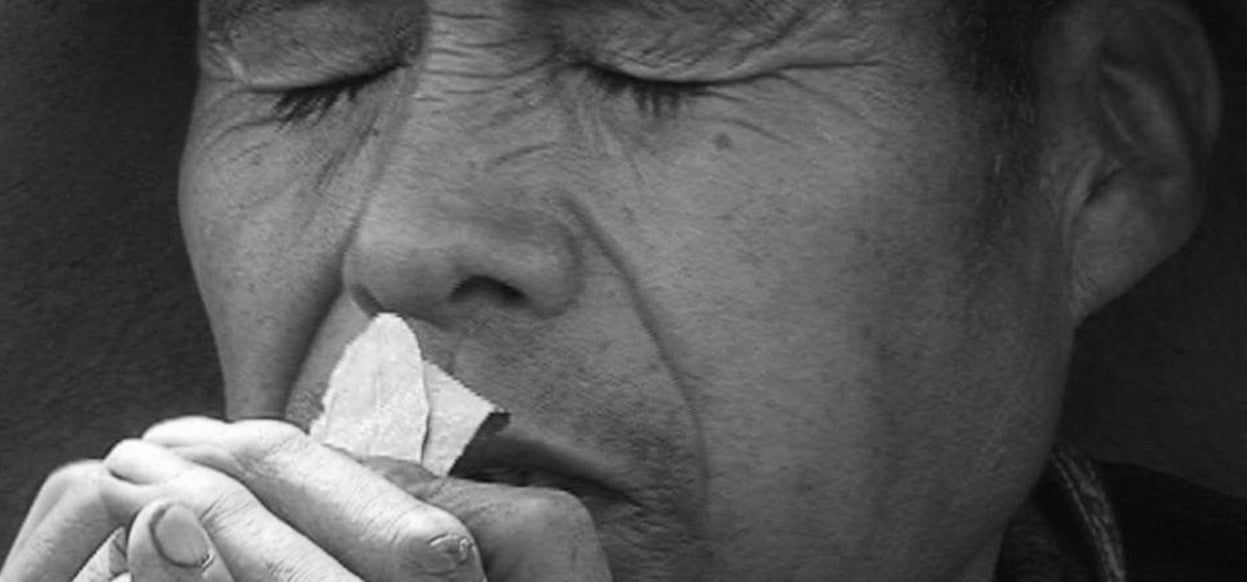Nasreddin Hodja has many names and is also sometimes referred to as “Nasrudin”,“the Mulla” and as “the Hodja” or “Hoca”. The Nasruddin stories are known throughout the Middle East and have touched cultures around the world.
Many nations of the Middle East claim the Mullah as their own, however, the Mullah, like all mythological characters, belongs to all humanity.
In this Article
That is why, the Telling Tradition of Nasreddin Anecdotes has been inscribed on the UNESCO Representative List of the Intangible Cultural Heritage of Humanity in 2022.
Telling tradition of Nasreddin Hodja, Molla Nesreddin, Molla Ependi, Apendi, Afendi Kozhanasyr Anecdotes – a philosopher and wise man – is recognized for his wisdom and humorous analyses and representations of society and life experiences. Although there are slight differences across communities in terms of imagery, character names and stories, the Mulla is shared as a common heritage in Azerbaijan, Kazakhstan, Kyrgyzstan, Tajikistan, Türkiye, Turkmenistan and Uzbekistan. Characterized by their wisdom, witty repartees, absurdity and element of surprise, the Nasreddin anecdotes often break with accepted norms, with the narrator finding unexpected ways out of complicated situations and always coming out as the winner by the power of word.
Jeremy Schiff, of Bar-Ilan University, Israel, writes:
Wit, common sense, ingenuousness, ridicule… and the kind of humor that reflects human psychology, exposes the shortcomings of a society, criticizes even state and religious affairs yet always settles matters amicably are the elements which together create a special kind of logic, the Nasreddin Hodja logic.
The Nasreddin stories are known throughout the Middle East and have touched cultures around the world. We put together a selection of humorous and bizarre Tree stories by Nasreddin Hodja, including variants, scripts and comics, enjoy.
Nasruddin was busy planting saplings. A passer asked him, “With what hope do you plant these trees! How many years more you think you will live to pluck the fruit of these trees?”
Nasruddin said with much dignity,
“you fool! Others planted, we ate the fruit, we plant and hope the others will eat.”
~ Idries Shah
~ ○ ~
Under the walnut tree
Mullah Nasreddin was resting under the shade of a tall and luscious walnut tree. As he sat daydreaming, he noticed huge pumpkins growing on delicate vines snaking across the ground. Then he looked up and squinted to see the tiny walnuts growing on the magnificent tree. “How strange mother nature is,” he thought, “to make plump pumpkins grow on spindly vines while little walnuts have their own impressive tree.”
Just then, a walnut fell from above and landed with a ‘tock’ on Mullah Nasreddin’s head. The mullah rubbed his sore head, picked up the fallen walnut, and looked high up towards the branches of the tree. Then, he looked over thankfully at the swollen pumpkins growing safely on the ground.
“Oh mother nature, you are wise!”
Variant: Walnuts and Pumpkins
Nasreddin Hodja was lying in the shade of an ancient walnut tree. His body was at rest, but, befitting his calling as an imam, his mind did not relax. Looking up into the mighty tree he considered the greatness and wisdom of Allah.
“Allah is great and Allah is good,” said the Hodja, “but was it indeed wise that such a great tree as this be created to bear only tiny walnuts as fruit? Behold the stout stem and strong limbs. They could easily carry the pumpkins that grow from spindly vines in yonder field, vines that cannot begin to bear the weight of their own fruit. Should not walnuts grow on weakly vines and pumpkins on sturdy trees?”
So thinking, the Hodja dosed off, only to be awakened by a walnut that fell from the tree, striking him on his forehead.
“Allah be praised!” he exclaimed, seeing what had happened. “If the world had been created according to my meager wisdom, it would have been a pumpkin that fell from the tree and hit me on the head. It would have killed me for sure! Allah is great! Allah is good! Allah is wise!”
Never again did Nasreddin Hodja question the wisdom of Allah.
~Ashliman
Variant: Hodja and the Mulberry Tree
Hodja Nasrudin was resting under a mulberry tree and wondering why Allah had given the mulberry tree tiny fruit while he gave pumpkins nothing but weak vines to hold them up. Then the mulberry fell “splat” on his forehead, and the teacher understood.
“Now I see, everything happens for a purpose.”
~ Indries Shah
Variant: Walnuts and Watermelons
As Nasrudin rested under a tall walnut tree one day, he looked a few yards to his side and noticed a big watermelon
growing on a thin vine near the ground.
Nasrudin looked up and said, “Great God, please permit me to ask you this: why is it that walnuts grow on big strong trees, while watermelons grow on think weak vines. Shouldn’t it be the other way around?”
But at that very moment, a walnut fell from high on up in the tree and hit Nasrudin square on the head.
“Ah!” remarked Nasrudin.
“I suppose Nature’s ways might not be as backward as I thought. After all, if a big watermelon fell out of the tree and onto my head, it might have killed me!”
~byjus.magazine
Variant: A Pumpkin Patch and Oak Tree
Mullah Nasrudin was sitting under an oak tree at the edge of a pumpkin patch. First he looked at the fragile vines connecting the pumpkins to each other. Then he looked up at the enormous oak tree, which was full of little acorns.
He said, “What can God have been thinking, making such a big tree to hold such little acorns, while these big pumpkins are held by such little vines? If it were me I would reverse them. “
Just then an acorn fell on the Mullah’s head and he let out a yell.
Then he looked at the pumpkins again and said, “Truly God knows better than I do. If one of those pumpkins had fallen on my head, I would have been knocked unconscious.”
~ Abdul Quasim Khan.
Variant: The Grand Plan
The Mulla was resting under a huge oak tree next to a field of melons. As he lay there, he thought, “Hmm, everyone says that the Creator has a grand plan, but look at this majestic oak tree with its ridiculously small acorns, and these spindly melon plants, with their huge fruits. I’d say the Creator made a mistake on this one.”
Suddenly an acorn fell right on his nose.
“OH! Now I understand the wisdom of the Creator!”
~ ○ ~
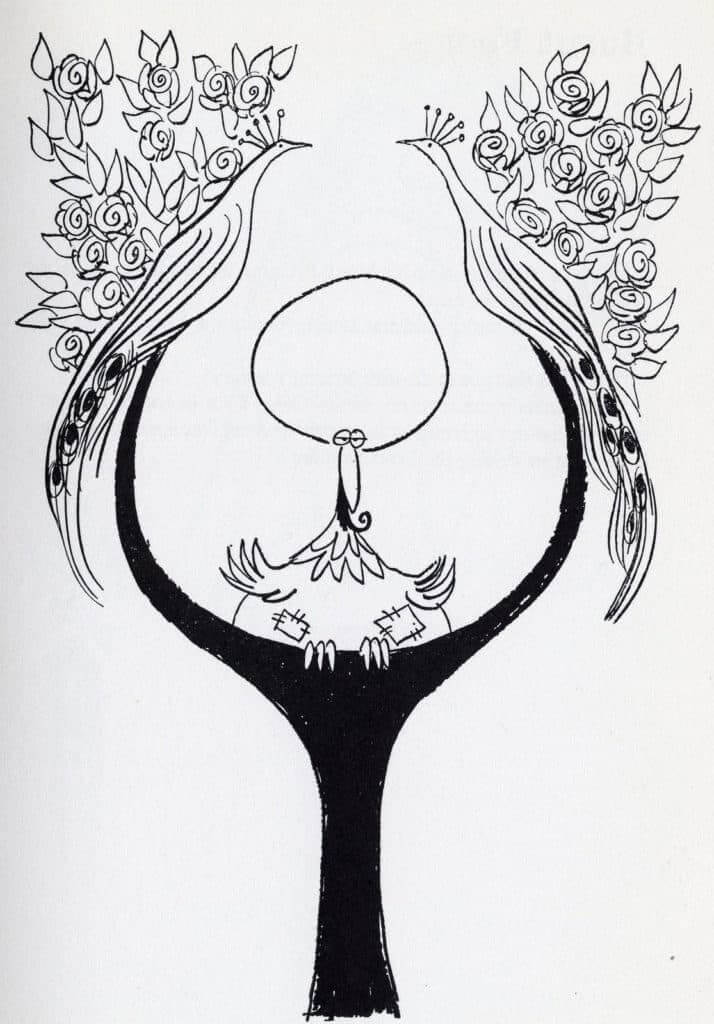
Nasrudin was once stealing apricots in an orchard when the gardener approached; he immediately climbed a tree. When the gardener asked him what he was doing, he replied, „Singing; I am a nightingale‟. The gardener then invited him to sing, and was amused to hear the painfully unmusical sounds the Mulla came out with.
„That isn‟t like any nightingale I’ve ever heard‟, he smiled.
„Then you obviously haven’t travelled‟, replied Nasrudin with hauteur. „I chose the song of a very rare and exotic nightingale‟.
~ Idries Shah
~ ○ ~
Nasruddin went to a garden. He saw the gardener planting trees. He asked, “What are you doing?” The gardener answered. “I am planting fruit trees to produce fruit in the future.” Nasruddin said, “If you please plant me too. Let us see what type of fruit I produce.” The gardener accepted his request and made him stand in a hole in the ground and started pouring soil in it till Nasruddin sunk up to the waist. After some time the chilly weather made him come out with a lot of difficulty and went to the gardener’s hut. The gardener asked “Why did it take so little time for you to stay there?”
Nasruddin said, “In fact I didn’t like my position over there. In addition I thought that my fruit would also not be good enough to eat.”
~ Idries Shah
Variant:
Once Nasruddin observed a grove of trees and thought, Since those trees bear fruit, why shouldn’t I?
So the Mullah went to the field and buried himself up to his belly in the ground. When night fell, the Mullah became cold and so he dug himself out and returned home.
The next day, when Fatima asked him how it went, he said, “It was okay at first. I was just about to put out roots when the cold killed them.”
~Ron J. Suresha
~ ○ ~
Mulla Nasrudin, visiting India, was told he should by all means go on a tiger hunt before returning to his country.
“It’s easy,” he was assured. “You simply tie a bleating goat in a thicket as night comes on. The cries of the animal will attract a tiger. You are up in a nearby tree. When the tiger arrives, aim your gun between his eyes and blast away.”
When the Mulla returned from the hunt he was asked how he made out. “No luck at all,” said Nasrudin.“Those tigers are altogether too clever for me. THEY TRAVEL IN PAIRS,AND EACH ONE CLOSES AN EYE. SO, OF COURSE, I MISSED THEM EVERY TIME.”
~ Idries Shah
Enjoy Tree stories by Nasreddin Hodja and another trickster from Bulgaria Clever Peter
Nastradin Khodzha and Clever Peter in the Cherry Orchard
One day the Hodja and Clever Peter went out to pick cherries. They climbed up the cherry tree, looking for the best fruit. The Hodja was bigger and stronger than Clever Peter, so he was able to reach the ripest cherries. At one point, he noticed that the cherries Clever Peter was eating were not quite ripe.
“Peter, why are you eating those green cherries? Come on up here, they’re better.”
“No thanks, these are pretty good.”
“Here, I’ll bend a branch down to you so you can get some of the good ones.” So the Hodja bent a big branch down toward Clever Peter, who took hold of it and began to eat the ripe cherries.
Suddenly, the Hodja let go of the branch and Clever Peter was flung out of the tree into some thorns. He landed right next to a rabbit. Clever Peter jumped up and deftly caught the rabbit by the back legs.
“Peter, why are you leaping around down there?”
“Oh, I saw a rabbit in the thorns, so I jumped down to catch it before it got away.”
~ Priscilla Howe
~ ○ ~
One day, Hodja climbed a tree, sat on a branch and began cutting the very branch he sat on.
A passerby saw him and yelled, “What are you doing? You are going to fall down.”
Hodja ignored the man and kept on axing the branch. Sure enough, the branch broke and he fell to the ground. In spite of the bruises, Hodja got up and ran to the man.
”Hey you! Since you knew I was going to fall, you should be able to tell me when I will die,” Hodja told the man and wouldn’t let him go without an answer.
Variant: Cutting off the branch you are riding on

One day the Hodja was up a tree cutting fire wood. Somebody passing by, noticed he was busily hacking at the very branch he was riding on.
Be careful, Hodja Effendi! he warned. It is the branch you are riding on that you are trying to cut off. Unless you stop at once, you will certainly come a cropper.
The Hodja didn’t bother to answer the man. Busy-bodies were everywhere. Never doing anything useful themselves, they kept telling you what to do, or not to do. While his mind was on this train of thought, down came the Hodja together with the branch he had just managed to severe.
His opinion of the man was immediately reversed. Surely this was a man not to be trifled with. In fact, he might be the wisest man he would ever meet in his life. As soon as he got himself disentangled, he ran after the man, but he was too late, for the man had disappeared.
Probably that was just as well. Because what he had had in mind was to ask the sage to tell him exactly when he was due to die.
Variant: Out on A Limb
Once, Nastradin Odzha went out to cut wood. He propped his ladder up on a branch, climbed it and began sawing away on that branch. Just then, Clever Peter happened by. “Nastradin Odzha, what are you doing? You’ll fall when you cut that branch!”
Nastradin Odzha just sniffed, Do you think I have never sawed a branch before? I know what I’m doing!
So Clever Peter kept walking.
Nastradin Odzha sawed, sawed, and sure enough, when he cut that branch, the ladder fell. He said to himself, “That man predicted that I would fall. He must be a real sage. Surely such a wise man can tell me how many more years I’ll live.”
He ran to catch up with Clever Peter. “You, there! Since you knew that I was going to fall, maybe you can tell me how many years I’ll live?”
Clever Peter gave a slow smile at this ridiculous question, “Well, now. You have nine donkeys. Load them up, take them to the top of a hill, and count how many times they fart, that’s how many years you’ll live.”
Nastradin Odzha did just what the man suggested. He took his donkeys up the hill. He listened carefully, counting each fart: four, five, six, seven. Thus he knew how long he would live. When seven years passed, he knew he would die, according to the donkey farts. He dug himself a grave, lay down in it, and waited for his soul to die.
At about this time, a camel driver went by, bells clanking. When Nastradin Odzha heard the bells, he stood up to see what the noise was. On seeing him, the camels were so scared they turned over their burdens. The camel driver grabbed him, whacked him hard, reloaded his camels and went on his way. Nastradin Odzha picked himself up and went back to the village. When he got there, his friends asked him, “Did you die? What’s it like in that world?”
He answered, “There’s everything in that world, everything beautiful, but one bad thing, the camel drivers hit really hard!”
~ Priscilla Howe
Variant: The Future
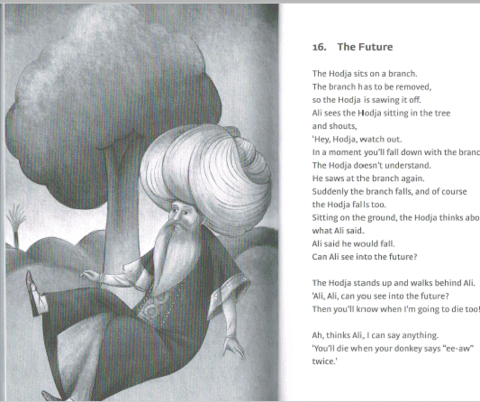
~ Durant Alan
~ ○ ~
Nasrudin and the barbarians
It was morning and Nasrudin rode on his donkey to one of the western hills. Beyond the western hills were isolated villages, whose people Nasrudin’s townsfolk despised and called barbarians.
The western hills were far away from the town centre. The hills were always quiet except for the melody of singing birds and the warbling streams, and Nasrudin enjoyed many hours of quiet and solitude there. The donkey too loved coming here. It would sleep for the most part of the sojourn and when inclined to do so, prance around the trees and bushes, chasing butterflies.
And so Nasrudin lay down in the shade of a tree on a hill. He listened to the birds, admired the colors of the trees round him, and soon fell asleep.
Nasrudin woke up suddenly. He had heard a loud noise. The donkey was still sleeping in the shade of a tree a few metres away. Then Nasrudin saw a villager cutting a tree nearby.
Nasrudin was quite angry with the villager for having woken him.
“You barbarian!”, shouted Nasrudin.
The villager dropped his axe on to the ground, and obviously afraid, he came to Nasrudin and he said in a low voice: “Sir. I am sorry for waking you up. I did not know you and your donkey were here. I am sorry for disrupting your civilized activity. “
“Oh, you barbarian!”, repeated Nasrudin.
“Please sir”, said the villager. “Many from your town have called me barbarian. Could you teach me to be civilized?”
And Nasrudin glared at the villager and he said: “It’s simple. I’ll give you an instant guide. Pick on anyone who is physically and socially weaker than you are and call that person a barbarian! Do this at least three times a month to different people and do it so others can hear you! Very soon, you will be considered civilized.”
And the villager thanked Nasrudin and he left immediately for his village, for truly he could not wait to practice the art of being civilized.
~ Raj Arumugam
The Man on the tree
One day, a man climbed up a tree. While climbing up, he did not realize how tall the tree actually was and kept climbing up. On reaching the top, when the man looked down, he realized that climbing down from the tree would not be as easy as climbing up. He could not think of any way of getting down without injuring himself seriously.
He asked the people who were passing by to help him. But nobody could think of a way of bringing him down safely. Soon, quite a few people gathered around the tree and tried to help the man, but no one knew what to do. The man remained stuck on top of the tree.
Just then, Nasruddin, who was walking by, saw this scene and wondered what was going on. The people standing around the tree told Nasruddin about the situation. “Oh!” Nasruddin said, “I’ll get him down in no time.” He took a long rope and threw one end of it up to the man telling him to tie the rope around his waist.
Everyone wondered what Nasruddin’s plan was. When one of them asked him, Nasruddin replied, “Just leave it to me. It’s a foolproof plan.”
When the man on the tree had tied the rope tightly around his waist, Nasruddin pulled the rope with all his force. As soon as Nasruddin did this, the man fell down from the tree and hurt himself badly. The bystanders were shocked at this.
Nasruddin and asked, “What were you thinking? What kind of a silly plan was that?”
Nasruddin replied, “Well, once I did exactly the same thing and saved someone’s life.”
One man asked him, “Is that true?”
“Absolutely!” replied Nasruddin, “The only thing I cannot remember is whether I saved him from a tree or from a well.”
~ Abdul Quasim Khan.
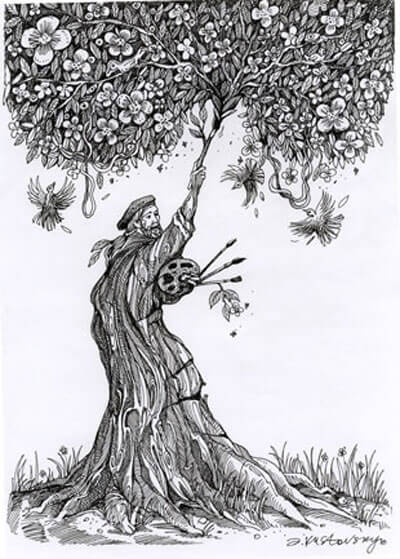
All the teachers say that spiritual treasure is something one finds alone. So why are we all here together?” asked a disciple of the Sufi master Nasrudin.
“You are all here together because a forest is always stronger than a lone tree,” replied Nasrudin.
“The forest maintains the humidity in the air, it resists the hurricane, and it helps to make the soil fertile.”
“But what makes a tree strong is its root, and the root of one plant cannot help another plant to grow.”
“Working together towards the same end and allowing each one to grow in his own way, that is the path for those who wish to commune with God.”
~ Paulo Coelho.
The Path Up Here
One day,the Mulla was walking home, wearing beautiful new slippers, followed by a crowd of ragged children. “Mulla, where are you going? Give us a coin! Watch me! Tell us a story! Do you have any candy? Where did you get those shoes?”
He came to a tree and saw his chance to escape. He put his slippers in his pockets and hoisted himself up to the lowest branch. The children yelled,
“Mulla, let us hold your slippers, we’ll take good care of them!”
The Mulla answered from the upper branches, “Thanks, but no, I think I’ll keep going on the path up here”.
When I was Alive…
One day the Mullah had climbed a neighbor’s apple tree to steal some fruits. His neighbor walked in the orchard and the Mullah fell as he tried to hide in the tree. The people crowded around the dazed Mullah and imagined that he had died. They started to carry him home. As they carried him, they got to a roundabout and did not know which road to take.
The Mullah who had just revived pointed to a road and said,
“When I was alive, I would take that road!”
Nasrudin Tries to Steal a Peach
One day, as Nasrudin rode his donkey, he spotted a ripe peach hanging over the wall of someone’s orchard.
He then positioned his donkey underneath it, stood up and grabbed a branch, and reached for the peach with his other hand.
As he did this, however, a noise startled his donkey and caused it to run off, leaving Nasrudin hanging from the tree.
Seconds later, the orchard spotted Nasrudin and yelled, “Thief!”
“What are you talking about?” replied Nasrudin.
“I am not stealing anything. Can’t you tell by the way I’m hanging here that I have simply fallen off of my donkey?”
~ Rodney Ohebsion
The Neighbor’s Garden
Nasrudin spotted some ripe oranges in his neighbor’s garden, and wanted to steal one.
He took his ladder up to the dividing wall, climbed to the top of it, and pulled the ladder over.
As he began climbing down to his neighbor’s side, he suddenly heard the voice of his neighbor exclaiming, “What are you doing here!”
Nasrudin calmly replied, ” I’m selling ladders.”
The neighbor countered, “Does this look like the place for selling ladders?”
“Well now,” Nasrudin said, “do you think that there’s only one place to sell ladders?”
~ Rodney Ohebsion
One day, a rabble of mischievous school children watched Nasrudin buy a kilo of apricots in the bazaar. Following him home in the hope of stealing the fruit, they saw him offer an apricot to a man who greeted him on the path.
“This is our chance,” thought the naughty urchins, and they raced ahead via a short-cut. One by one they approached Nasrudin with greetings and a deep bow. Each of the boys was given an piece of fruit.
When Nasrudin’s bag was empty, he saw the doctor coming towards him and immediately hid behind a tree.
“Mulla, are you quite well?” asked the concerned physician, seeing him cowering behind the tree. “Yes,” replied an embarrassed Nasrudin, “but I have no apricots left!”
Eating His Money
Mulla Nasrudin, as everyone knows, comes from a country where fruit is fruit, and meat is meat, and curry is never eaten.
One day he was plodding along a dusty Indian road, having newly descended from the high mountains of Kafisistan, when a great thirst overtook him. “Soon,” he said to himself, “I must come across somewhere that good fruit is to be had.”
No sooner were the words formed in his brain than he rounded a corner and saw sitting in the shade of a tree a benevolent-looking man, with a basket in front of him.
Piled high in the basket were huge, shiny red fruits. “This is what I need,” said Nasrudin. Taking two tiny coppers from the knot at the end of his turban, he handed them to the fruit-seller.
Without a word the man handed him the whole basket, for this kind of fruit is cheap in India, and people usually buy it in smaller amounts.
Nasrudin sat down in the place vacated by the fruitier, and started to munch on the fruits. Within seconds, his mouth was burning. Tears streamed down his cheeks, fire was in his throat. The Mulla went on eating.
An hour or two passed, and then an Afghan Hillman came past. Nasrudin hailed him. “Brother, these infidel fruits must come [from] the very mouth of Sheitan!”
“Fool!” said the Hillman. “Have you never heard of chilies of Hindustan? Stop eating them at once or death will surely claim a victim before the sun is down.”
“I cannot move from here,” gasped the Mulla, “until I have finished the whole basket.”
“Madman! Those fruits belong in curry! Throw them away at once.”
“I am not eating the fruits any more,” croaked Nasrudin, “I am eating my money.”
~Idries Shah
One day Nasruddin, while passing by a place, and had a few apricots in his sleeve. He suddenly saw some people who were sitting under a tree. Calling them he asked a question, “if any one of you found out what I have in my sleeve, I will give the biggest apricot to him.”
One of them said,” If any one answers this question, he must be having prophecy.”
Peach Payment
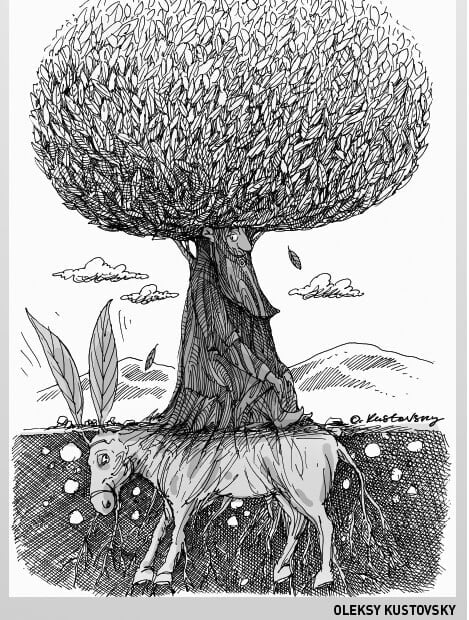
Nasrudin had moved to a new town and was badly in need of money. Ge agreed to pick peaches off of a local man’s orchard for fifty dollars a day.
However, after he completed a full day’s work and went to collect his pay, the orchard owner told him he didn’t have any money.
“But listen,” he added. “Come back here tomorrow afternoon, and I’ll let you eat as many peaches as you want.”
Nasrudin, quite disappointed, reluctantly agreed; and the very next day, he arrived at the orchard precisely at noon.
Seconds later, he climbed a ladder to the top of a tree, grabbed a peach, and began eating it rapidly.
The orchard owner, quite puzzled by Nasrudin’s behavior, couldn’t help but ask him about it.
“Mulla”, he said, “Why in the world did you choose to eat from the top of that tree? Wouldn’t it be easier to just each the peaches on branches closer to the ground?”
“That will not do,” Nasrudin replied.
“And why not,” the man curiously asked.
“Well,” replied Nasrudin, “haven’t you ever heard the saying, ‘If you are sweeping stairs, start from the top.’”
“What does that have to do with this?” the man asked.
“Simple,” said Nasrudin. “Unless I am systematic and start from the top of each tree, how else will I be able to eat every peach in this orchard by the day’s end?”
~ Rodney Ohebsion
Walking home one wonderful morning, Nasruddin thought that it would be a good idea to take a short cut through the woods. “Why,” he asked himself, “should I plod along a dusty road when I could be communing with Nature, listening to the birds and looking at the flowers? This is indeed a day of days; a day for fortunate pursuits!”
So saying, he launched himself into the greenery. He had not gone very far, however, when he fell into a pit, where he lay reflecting.
“It is not such a fortunate day, after all,” he meditated; “in fact it is just as well that I took this short cut. If things like this can happen in a beautiful setting like this, what might not have befallen me on that nasty highway?”
While Nasreddin Hodja was planting young fruit tree saplings in his garden, one of his neighbors asked him, “When will these trees mature and give fruit? You’ll never get to eat that fruit.” The Hodja retorted,
“Of course, none of us will eat the fruit of these trees I’m planting. We eat he fruit of the trees the people before us planted. Let the next generation eat the fruit from our trees.”
One day when Nasreddin Hodja had climbed a tree in his garden and was busy picking the fruit, he saw a camel caravan approaching. “Stop!” he commanded the camel drivers. “Take your camels some other way.” “Hey! Are you afraid of camels?” jeered the camel drivers “No,” said the Hodja, “but this tree I’ve climbed is one that’s never seen a camel. If it suddenly catches sight of you, it might be startled and throw me down.”
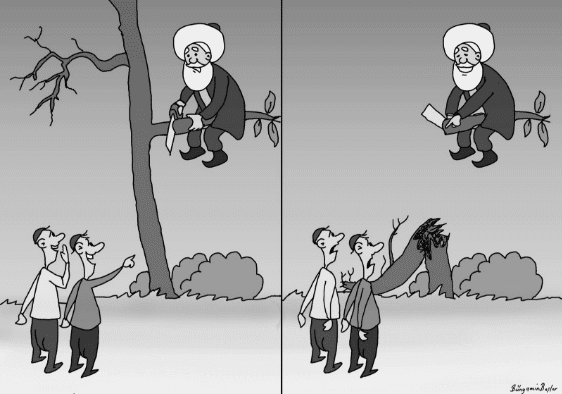
One day, Nasreddin Hodja was preaching from the pulpit,
“Oh, my friends, Give thanks to Almighty God that he made the sky without it’s needing any support. Otherwise all the trees in the world would not be enough to hold it up.”
Bubbles
Once Nasrudin passed some time with a group of children who were playing with bubbles. They could make clouds of little bubbles, filling the air with shimmering, sparkling globes. They also had a large wire loop that could make huge bubbles. One particularly large bubble caught an updraft and floated toward the sky.
However, before it could get completely clear it hit the branch of a tree and popped. Nasrudin shook his head and smiled:“It is tough world for bubbles,” he said.
~ Eric K. Sorensen
Looking for Eggs
[dropcap style=”no-background”] “W [/dropcap]hat are you doin in that tree, Mulla?”
“Looking for eggs.”
“But those are last year’s nests!”
“Well, if you were a bird and wanted a safe place to lay, would you build a new nest, with everyone watching?”
Climbing the Great Pyramid
Nasrudin was sitting among the branches of a tree, sniffing the blossoms and sunning himself.
A traveller asked him what he was doing there.
“Climbing the Great Pyramid.”
“You’ re nowhere near a pyramid. And there are four ways up a pyramid: one by each face. That is a tree!”
“Yes!” said the Mulla.
“But it’s much more fun like this, don’t you think? Birds, blossoms, zephyrs, sunshine. I can hardly think I could have done better.”
Chip of the Old Block
Rashid was the youngest son of Mulla Nasruddin. Being son of his old age he was spoilt and Mullah doted on him. One evening Mulla took him along to take the air in the royal gardens.
The boy was sure the stick was not necessary for his father. He threw it away causing unforeseen trouble for the Mulla.

Mulla took the boy back home assuring the local worthy to drive some sense into the boy.’After all you are a chip of the old block’ said the Mulla, “Beating you is like beating me. So there is only one thing left.”
Mulla beat the old tree saying,”See what trouble your stick has caused me?”
~ bennythomas
The Olive Trees and the Driftwood
Afarmer asked Nasrudin whether his olives would bear in that year. “They will bear,” said the Mulla.
“How do you know?”
“I just know”
Hours later the same man saw Nasrudin wending his way home, tired out, still without fuel.
“You are a man of perception, who can tell whether an olive tree will bear or not. Why can’t you tell whether there is wood on a seashore?”
“I know what must be,” said Nasrudin, “but I do not know what may be, that is all.”
Later the same man saw Nasrudin trotting his donkey along a seashore, looking for driftwood.
“There is no wood here, Mulla, I have looked,” he called out.
Mullah Nasrudin was cutting a tree with a rusted ax. A friend came by and said, “Mullah, you cannot cut the tree with that rusted ax. Sharpen it first. Then cut the tree.” Nasrudin replied, “Can’t. Have to cut it very quickly. Don’t have any time.”
Man Searches for Joy
One day, Nasrudin began talking to a man from another town. The man lamented, “I am rich, but I am also sad and miserable. I have taken my money and gone traveling in search of joy-but alas, I have yet to find it.”
As the man continued speaking, Nasrudin grabbed the man’s bag and ran off with it. The man chased him, and Nasrudin soon ran out of the man’s sight. He hid behind a tree, and put the bag in the open road for the man to see.
When the man caught up, he located the bag, and his facial expression immediately turned from distress to joy. As the man danced in celebration of finding his bag, Nasrudin thought to himself,
“That’s one way to bring joy to a sad man.”
~ Dimas Akuno
The Quilt Is Gone, the Fight Is Done
One winter night, Mullah Nasruddin and his wife Fatima were sleeping soundly in their own beds, snuggled up under the covers and quilt, when the loud din of quarreling voices outside wakened them. It sounded like two thieves were drunk and arguing about something, but neither Nasruddin nor Fatima could make out quite what was the source of conflict.
After the noisy row had gone on for a while, Fatima urged her husband to get out of bed and investigate the matter. “They could be thieves,” she whimpered, pulling the bedsheets up close. “They could be terrorists.”
Yawning, Nasruddin agreed to check out the disturbance. He was far too sleepy to bother to dress in his turban and cloak, which would have shown the shouting hooligans that he was a village judge, a man not to be disturbed in the middle of a heavenly dream. Instead, Nasruddin wrapped the quilt that Fatima had painstakingly hand-stitched around his shoulders and trudged outside to investigate the commotion.
As Nasruddin stepped outside into the cool night air to confront the two boisterous men, they stopped their fighting and faced the Mullah. Before Nasruddin could even say, “Stop fighting, will you?” the two men set upon him with fists and shouts. One of the thieves grabbed Fatima’s quilt from off the Mullah’s back, spun him around, then tore off into the night with the other man, leaving Nasruddin naked and stupefied.
Finding himself shivering, Nasruddin dashed upstairs to the bedroom, where Fatima was awaiting his return. She asked, “Nasruddin, what happened to the two men? What were they arguing about at this time of night? And where did my beautiful handmade quilt go?”
Nasruddin could only sigh and reply, “They must have been fighting about your quilt, because as soon as they took it, they stopped fighting. Still, I’m glad to report, now that the quilt is gone, the fight is done.”
Thank God I Wasn’t in It
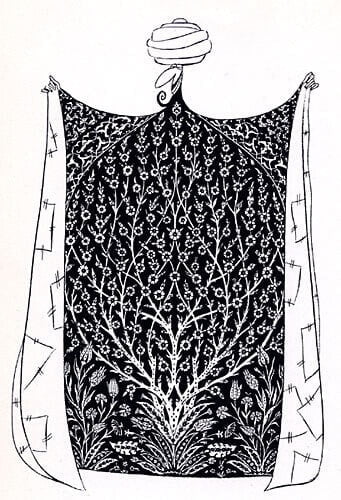
After Fatima’s quilt was stolen, Nasruddin bought a bow, quiver, and some arrows. It made him feel more secure somehow, knowing that he had a weapon to protect his family and home — and his quilt — so he placed it near his bed.
One breezy night a loud flapping and rustling in the backyard wakened Nasruddin.
Seeing his wife Fatima snoring asleep in her bed, he crept to the window, picking up his trusty quiver and bow. There was definitely something moving out back, some sort of shadowy figure with his arms aflutter in the strong wind.
Nasruddin rubbed his eyeballs twice and blinked thrice and shook his head until his neck cracked, but he could only make out the cloak of the man standing at the far end of the backyard near the tree. The moonlight in the wind scattered clouds that obscured most of the faceless apparition, but Nasruddin peered at the dark figure in the corner of the yard as hard as he could, and he thought he recognized — could it be? — that someone was wearing his cloak? The thief must have nabbed it from the branch where Fatima hung it to dry after she’d cleaned it last night, and now was prancing about in glee at having stolen such a lovely warm cloak.
Nasruddin looked over at the snoring Fatima, his beloved first wife of so many years, and whispered, “Don’t worry, my dear. I’ll protect you — and my cloak!”
He flung the windows open, hoping the sound would scare the thief leaping in and out of the shadows in the backyard, but still the rascally character danced next to his apricot tree, flailing his arms wildly, now seeming to taunt Nasruddin.
He issued a warning: “Enough of your barbaric thievery! Return my fine cloak to me right now, or I’ll shoot you right there!” Still the man — perhaps it was a ghoul or a djinn! — seemed to sway and wave his arms as the wind blew sharply around him.
“All right, you scoundrel! You asked for it!” Nasruddin was so terrified and angry that the bow shook in his right hand as he placed his arrow shakily on the notch, pulled back the drawstring with his elbow akimbo — and closed his eyes tight.
He released the bow and ducked. The arrow hit something — he heard the sound of fabric ripping and a thud. Nasruddin squinted his ears, if such a thing can be done, listening for . . . the intruder . . . or anything.
As the breeze continued rustling the branches it became clear that the arrow had hit its target! Nasruddin peered over the edge of the window but, with the moon still darting in and out of the clouds, he could not see any movement near the apricot tree. He raised his bow triumphantly, silently praising God for protecting Fatima and his children from such an evil spirit, when suddenly he realized in horror — he’d just shot a man!
Nasruddin gasped, dropped the bow, shut and latched the windows, then ran downstairs and locked and barricaded the front door. Then he ran upstairs and seeing Fatima still sound asleep and snoring, he jumped under the quilt and pulled it around him tight, shivering like a little question mark scrawled in his bed until finally he fell asleep.
Fatima’s voice of course woke him the next morning, entirely too early, but not from beside him in bed. She was yelling for him from outside the locked windows. Nasruddin tumbled wearily out of bed and cautiously opened a window. Now he could hear Fatima’s familiar screeching voice and see clearly, as she stood beside the tree, what he’d shot the night before . . .
Fatima was cursing Nasruddin as she tried to pull the arrow from his cloak to release it from the branch where she had hung it. Nasruddin’s arrow had pinned the cloak right between the shoulders to the apricot tree.
Nasruddin waved his hands high above his head, dancing ubband shouting, “Praise God! God be praised!”
After struggling with the cloak, Fatima ended up tearing a rather large hole in it, leaving the arrow embedded in the tree. She stormed back to the house up to the window where Nasruddin was still praising God loudly.
Fatima yelled, “What are you saying ‘God be praised’ for? You ruined your best cloak!”
Nasruddin embraced and kissed his wife, then held her hands as he danced around the room. “But do you not see, my dear? If I had been wearing my most unfortunate cloak, I would have been shot through the heart and killed myself! Praise, praise God, I am saved!”
~Ron J. Suresha
Once upon а time there was a carpenter who had so much work to do that he decided he needed an assistant. The carpenter was surprised, when a strange, weak-looking man named Nasrudin appeared at the door.
At first the carpenter did not want to give Nasrudin the job because he didn’t look very strong; however, the carpenter said to Nasrudin, “Ok, I’ll give you a chance. Do you see the forest over there? Take my axe and chop as much wood as you can.”
At dusk Nasrudin returned, and the carpenter asked, “How many trees have you chopped down?”
“All the timber in the forest”.
The carpenter ran to the window and looked out. There were no trees left standing on the hillside. Nasrudin had chopped down the whole forest. The carpenter asked Nasrudin, “Where did you learn to chop wood like that?”
“In the Sahara Desert,” Nasrudin answered.
“That’s ridiculouse ,” laughed the carpenter.
“There aren’t any trees in the Sahara Desert.”
“There aren’t any now.” Nasrudin replied.
The Mulla was working as a vizier to a small kingdom. The king was very generous; not very rich (the kingdom was small) but still very generous. Every year Nasrudin would come and tell him that his wife had given birth to a child, and the king would give valuable presents to him, to the child, to the mother, but then it became too much because it was every year. When the twelfth child was born, and Nasrudin came, the king said,
“Now Mulla, it is taoo much, and the world is suffering too much from over population, what are you doing? If you go at this speed you will create a small nation. You go on, every year — stop it! Let this child be the last! And if you cannot stop, if you are unable to stop, then it is better to commit suicide rather than to overburden the earth.”
Nasrudin was very depressed.
Then the thirteenth child was born – what to do? So he thought, it is better now not to go to the king – go to the forest and commit suicide, as the king had said. So he went to the forest, he prepared everything to hang himself, just a split second and he would have been hanging under the tree dead – suddenly he said, “Nasrudin! Beware! You may be hanging the wrong man!”
Nasruddin said, “That I know — but I have no more uncles. That makes me sad.”
~Osho world
What in the world happened yesterday?” a fellow asked Mulla Nasrudin. “They are saying around the tavern that you acted like a coward.””Well, I am no fool,” the Mulla said.
“Some of the children found a big hornet’s nest in the top of a tree and dared me to climb up and get it. And I just didn’t do it, that’s all.” “Whether you were smart or not,” said the friend, “That sort of thing makes you unhonored and unsung around here.” “THAT’S RIGHT,” said Nasrudin,
“BUT I AM ALSO UNHARMED AND UNSTUNG.”
~ Idries Shah
Mulla Nasrudin was sitting under a tree chatting with a neighbour, when his boy came up the road carrying a chicken. “Where did you get that chicken?” Nasrudin asked his boy. “Stole it,” said the boy. Mulla Nasrudin turned to his friend and said proudly, “THIS IS MY BOY. HE MAY STEAL, BUT HE WON’T LIE.”
~ Idries Shah
Mulla Nasrudin and one of his friends were lying on the green grass beside a country road. Above them was the warm sun. Birds were singing in the trees. It was quiet, restful, and a peaceful scene.
“Boy,” said the Mulla, “right now I would not change places with anybody not for a million dollars.” “How about five million, Mulla?” asked his friend. “No, not even for five million,” said the Mulla. “Well,” said the other, “how about one dollar?” Mulla Nasrudin sat up.
“WELL,” he said, “THAT’S DIFFERENT. NOW YOU ARE TALKING REAL MONEY.”
~ Idries Shah
THE MAJESTIC FOOL ~ WOLVES
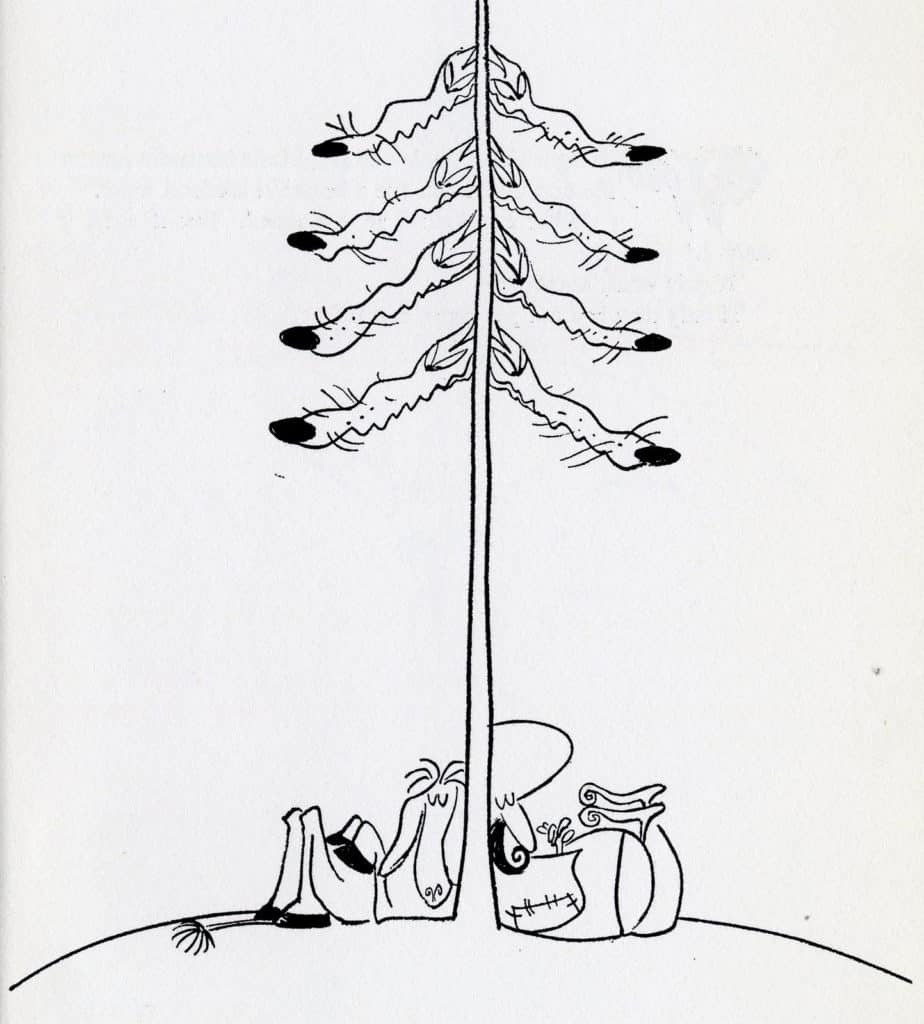
~ Garrett Gilchrist noted this from the early Nasrudin script:
Cut in to reveal six long-headed wolves posing as a tree, They zip in and run over to another pole, a little closer to Nasrudin, and pose again as a tree.
A snow storm hits and as it clears, we cut to Nasrudin asleep, with snow covering his body, looking like a white coffin, the donkey still sits, bored, at his feet,
Cut to the wolf-tree entirely covered in ice. The ice cracks and the icicles drop off, revealing the wolves who have turned blue from the cold. They shiver terribly and run to another tree.
Cut to the donkey whose ear lifts and whose eyes open wide,
Cut to the woIves who run to another tree.
Cut to the donkey, more worried.
Cut to the wolves sticking out from behind a tree, all six of them clutching at their stomachs – they are obvious1y starving to death. They zip back in and go down the hill from tree to tree, like a slalom,
Cut to the donkey, now very worried, Looking round stupidly.
Cut to the wolves who shoot out from behind the tree, do a long run and zoom into the air.
We hear the sound of a screaming jet engine and they land on the donkey, who disappears in a cartoon bIurr.
Jet and buzz-saw and eating noises as the blur zooms around,
Cut to Nasrudin with one eye open looking at the demotion of his donkey, entirely calmly, he leans to us and says.
“Such is life! One thing is conditional upon another.”
Cut to the wolves, now with huge, full bellies, who burp and snicker, pick their teeth and laugh gleefully to each other in front of Nasrudin, rubbing their bellies with delight.
~ ○ ~
Keep exploring:
Works Cited & Multimedia Sources
- Ashliman D.L.. Nasreddin Hodja. Tales of the Turkish Trickster. 2001-2009.
- Durant Alan. Nasreddin Hodja. tales of the Turkish trickster.
- Idries Shah. The Pleasantries of the Incredible Mulla Nasrudin. Le Cain. 1975.
- Mulla (Hodja, Hoca) Nasrudin (Nasreddin, Nasruddin) Folktales.
- Mulla Nasruddin Stories: Chip of the Old Block.
- Nasrudin and the Trees: Seven Tales | Spirit of Trees.
- Özdemir Nebi. The Philosopher’s Philosopher Nasreddin Hodja. Ankara: Ministry of Culture and Tourism. 2011.
- Sorensen Eric K. New Tales of Nasrudin. 2006.
- THE MAJESTIC FOOL.WOLVES.
- The Turkish Jester by George Borrow.
- The world of the sufi – Idries Shah Foundation.
- © Oleksey Kustovsky.
- © Williams Richard.
